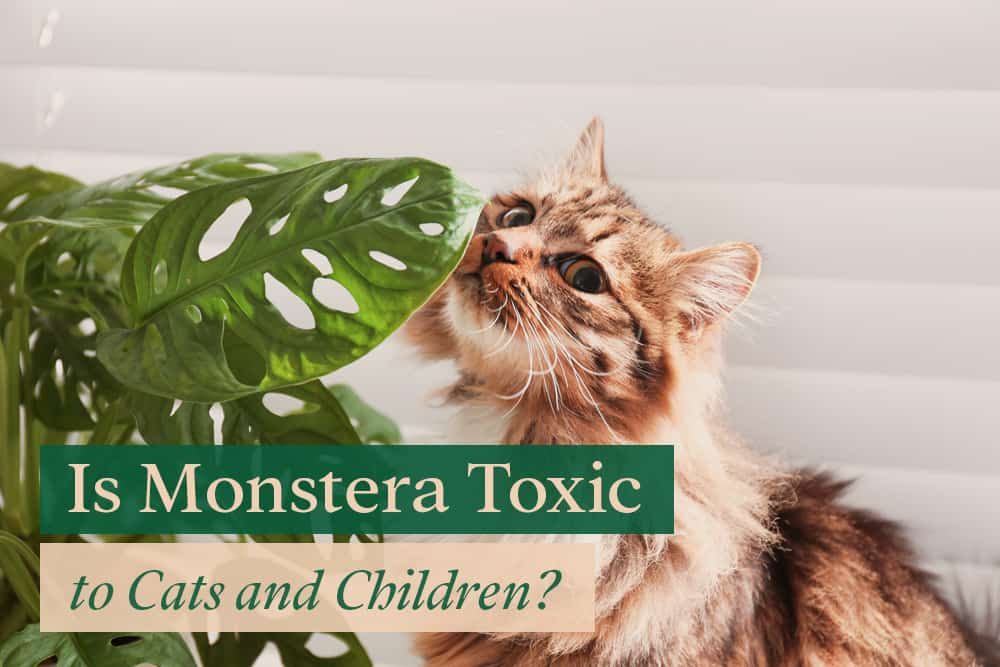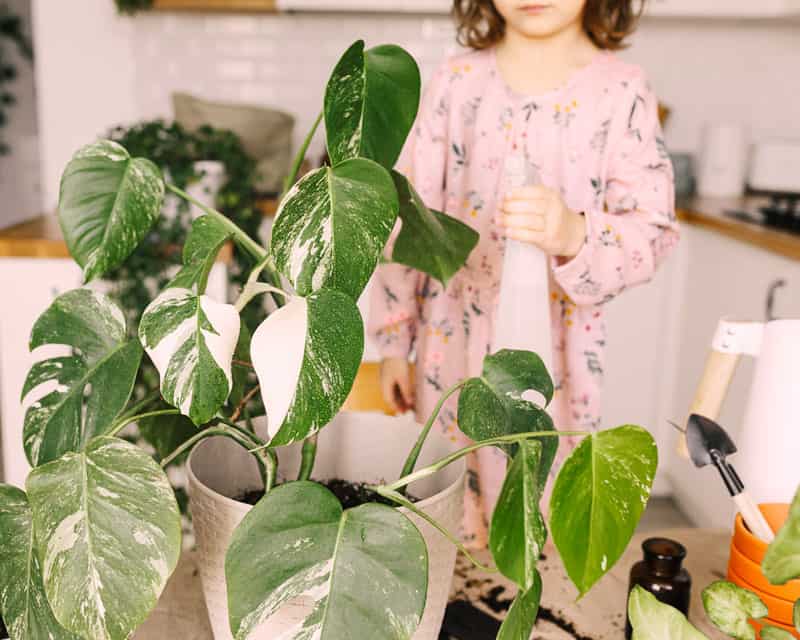
A popular houseplant, the Monstera is a great addition to any living space and can add some natural beauty. But have you ever wondered if it’s poisonous for pets or babies?
Monstera contains calcium oxalate crystals that are a potent irritant. If ingested by pets or children, it can cause irritation of the mouth and tongue and difficulty swallowing.
In this article, we will discuss in detail steps to take if your furry friends or child accidentally ingests your Monstera leaves. We will also talk about some precautions you can take to avoid it happening at all.
Let’s get started!
Monstera contains Calcium oxalate crystals
What are Calcium Oxalate Crystals?
Calcium Oxalate crystals are needle-shaped, microscopic irritants found in every part of a Monstera plant, including the leaves, stems, and saps.
Calcium oxalate crystals serve multiple purposes for a Monstera. They can help regulate tissue calcium, protect the plant from being eaten by animals, and help get rid of unwanted minerals.
While beneficial for the plant, these crystals can be potentially harmful to humans and animals. It can cause mild irritation or more severe reactions depending on the type of contact made.
Is it toxic to cats and dogs?
When your pet consumes a large part of a Monstera, Calcium Oxalate crystals are absorbed into its body.
These crystals can bind with calcium in the body. This causes a decrease in the amount of calcium and then can cause problems like nephrosis and kidney injury.
How about to babies and kids?
Similarly, high amounts can cause some serious issues that require immediate medical attention.
Calcium Oxalate Crystals have been shown to cause kidney stone formation in children and adults. It can also lead to various oral and skin irritations.
Should I be worry if my pets or baby consumed a Monstera?
Pets and children who consume a Monstera are likely to display some sort of reaction.
However, the symptoms in pets and children will be different. Make sure that you keep an eye on them when there is contact or if they have ingested your Monstera plant.
Symptoms to watch in pets
The Calcium Oxalates will cause a burning sensation around its lips or mount. You will notice that your pet will paw at the mouth a lot, have oral swelling, and even drool excessively.
Your cat or dog may also experience loss of appetite and vomiting from discomfort in the stomach.
However, keep in mind that it is only when the plant is eaten in large quantities that there is a risk of serious adverse reactions or death.
Symptoms to watch in babies or children
When your child eats a Monstera plant, he/she may drool and experience difficulty swallowing or breathing. Most common reactions include pain in the throat and respiratory responses such as coughing.
Additionally, skin contact with Monstera sap can also lead to rashes. While contact on the eye may cause irritation or abrasions.
Treatments
If your pet or child eats a Monstera, rinse the mouth with water and spit it out. Do not swallow the water. The main goal is to get as much Calcium Oxalates out of the mouth as possible.
It is normal for symptoms like pain and irritation to continue if they are experiencing a sore throat or mouth. Sucking on iced chips or eating cold food like ice cream might help with this.
Consuming fluids is suggested but do not force them, especially when they are having trouble breathing or swallowing.
If they have skin contact with the sap, wash for 15 minutes with soap. But if they touch their eye, use water or eye drop to rinse the sap.
For additional information, you might want to contact:
- Call poison control 1-800-222-1222 for 24hr assistance or poison control website: poison.org
- Call Animals- ASPCA 24hr poison hotline 1-888-426-4436
How to keep pets and babies away from plants?
Keeping Pets away from Monstera
If your pet is a chewer, then avoid giving them access to the plant unless they are being supervised.
- You can place a physical barrier between the pet and the plant, like chicken wire set up to keep your pet away from your Monstera.
- A plant cabinet is a good idea because it creates a beautiful home fixture and keeps the plant safe and out of reach.
- Ensure that dead and dying leaves are pruned and properly disposed of.
Kids proofing your plants
Eliminate all access to plants until your child is old enough to understand the dangers and resist the temptation by:
- Using tall plant stands, countertops, or shelves. Remember to properly secure these so they can’t pull them down onto themselves.
- Regularly maintain your plants to make sure that they don’t vine down into where your pet or child can reach. There are ways to help keep the leaves up, like velcro, moss poles, and stakes. You can buy these online or at a home improvement store.
For older children, teach them proper Monstera care and warn them of the dangers of prolonged contact and the consumption of leaves.

In conclusion
Pets and children who consume a Monstera plant are likely to display some sort of reaction. However, keep in mind that it is only when the plant is eaten in large quantities that there’s a risk for serious adverse reactions.
When this happens, it is advisable to rinse the mouth with large amounts of water to flush the Calcium Oxalate crystals and call your veterinarian or poison center.
Finally, make sure that you keep your Monstera out of reach. This will help prevent pets and children from chewing on the leaves.
